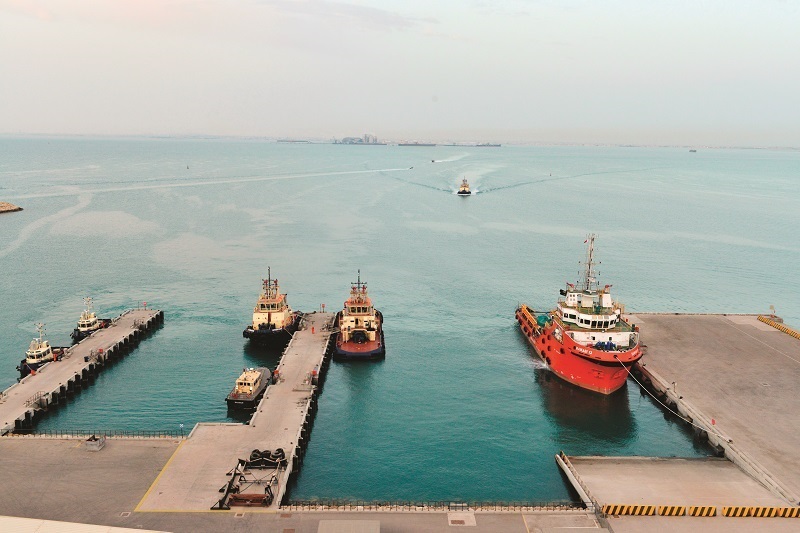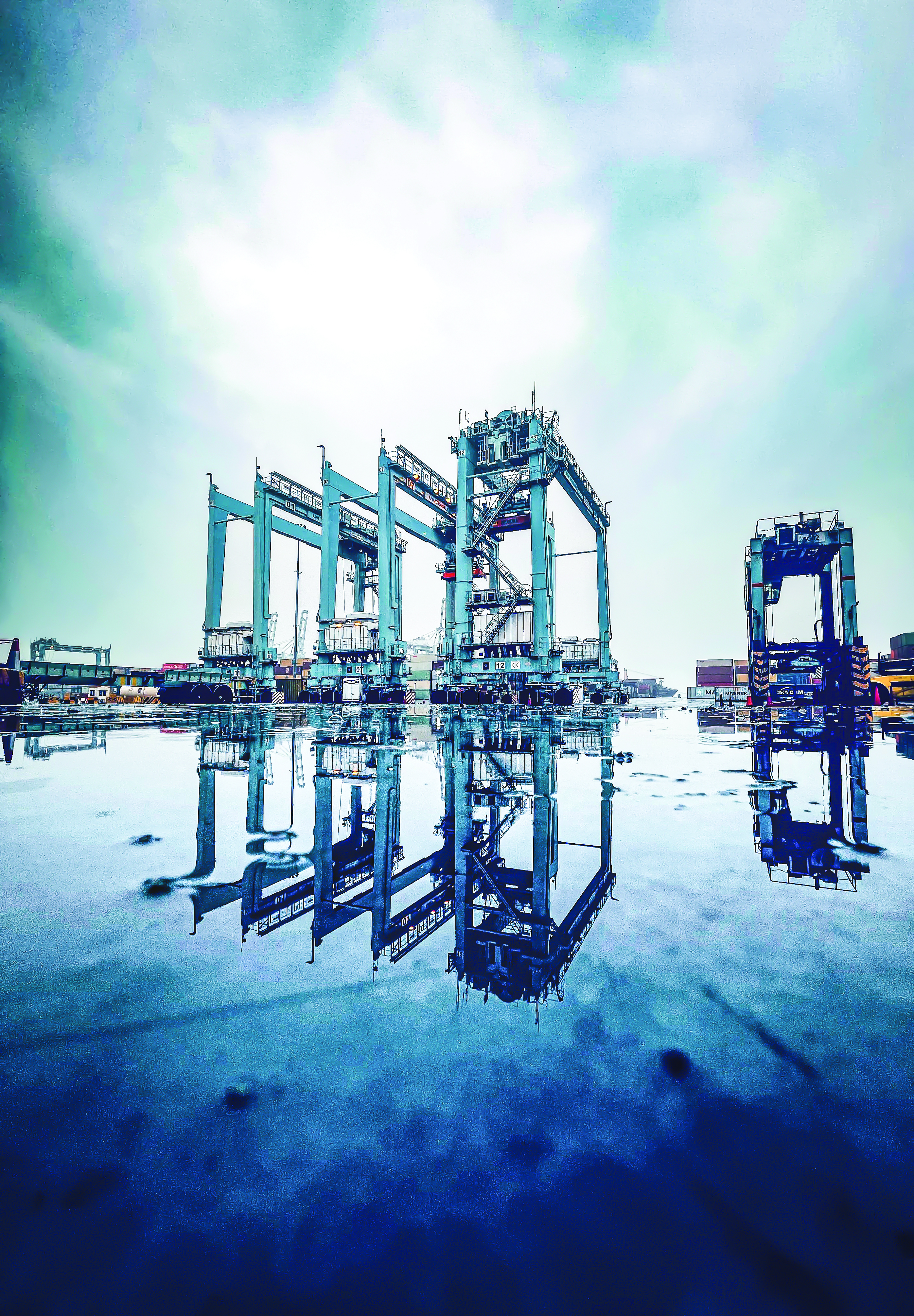Abdelrahman Elshamy shares APM Terminals Bahrain's vision : Towards reducing ships’ port stay by 30% and prioritizing the use of clean energy
APM Terminals Bahrain, a subsidiary of A.P. Moller-Maersk and the operator of Bahrain's Khalifa Bin Salman Port, is advancing its development initiatives to achieve energy self-sufficiency via solar energy.
This strategy aligns with Bahrain's Vision 2040, which prioritizes the use of clean energy. In Robban Assafina’s interview with APM Terminals Bahrain's Chief Operating Officer, Abdelrahman Elshamy reaffirms the company's dedication to establishing Khalifa Bin Salman Port as the premier port in the Middle East to operate solely on 100% clean energy. The completion of this project is anticipated late 2024.
Elshamy discusses several development plans scheduled for implementation over the next three years, including a 30% reduction in ships’ port stay to increase handling volume within existing capacity. Concurrently, the company will continue to advance through technology adoption and automation of port operations.
To begin with, we would like to talk about your professional career.
My professional maritime journey began 19 years ago, back when I joined the Suez Canal Container Terminal in Egypt. Eleven years ago, I transitioned to Bahrain, where I assumed multiple roles ranging from Operations Director and Head of Franchise to my current position as Chief Operating Officer, which I assumed in 2020.
Where is APM Terminals Bahrain positioned in the Arabian Gulf and globally?
APM Terminals Bahrain holds a prominent position among port companies in the region, renowned for its exceptional productivity and operational efficiency. Undoubtedly, it stands as the second-most effective in crane performance globally, following Yokohama, Japan. Recognized for our state-of-the-art multi-purpose ports, our company attracts considerable attention within the ports and terminals sector. APM Terminals Bahrain leads the industry in implementing innovations such as solar energy systems, asset digitization, and Crane OCRs.
With a commitment to continuous improvement, we possess the capacity to invest in initiatives that enhance our operations, aligning with governmental expectations for high performance.
Tell us about APM Terminals Bahrain solar energy initiative for port operations.
We take pride in our ongoing solar energy project, scheduled for full operation late 2024. This initiative establishes APM Terminals Bahrain as the operator of the first port in the Middle East to fully transition to 100% clean energy in its port operations.
In addition to this milestone, we're engaged in several projects aligning with both Bahrain's Vision 2040, aiming for complete clean energy adoption, and AP Moller Maersk's vision, emphasizing investments in several markets such as shipping and ports. Looking ahead to 2026, a significant milestone for us involves a specialized equipment project, which will be carried out in several stages in order to establish its related infrastructures and ensure adherence to environmental standards.
Furthermore, as part of our efforts to achieve self-sufficient energy through solar energy, we've initiated the adoption of energy-efficient equipment, starting with port lighting (LED technology).
How do you evaluate the company’s performance in 2023?
During 2023, the company encountered multiple challenges arising from shifts and events within the maritime sector. Despite these obstacles, the port managed to accommodate an increased number of container ships, rising from an average of 25 to 38. Notably, this increase occurred without expanding the port's capacity; Instead, the company maintained production levels by adjusting ship sizes, a measure taken in response to the significant shifts in shipping routes and the surge of numerous ships.
Recently, the company introduced new technology to the port, namely OCRS and the Truck Alignment System. As is typical with any new technology implementation, the company required some time to adapt to these changes to uphold productivity levels. Despite the challenges, we successfully saved over 1,000 hours of ships’ port stay, marking an 18% reduction.
This achievement not only benefited ship owners by reducing costs but also demonstrated our commitment to enhancing efficiency. Coupled with the reduction in ship size observed during the year, we were able to enhance performance, integrate new technology, and strengthen the company's efficiency compared to previous years.
What about the competition?
The competition among port operating companies is influenced by various factors. At the level of shipping lines, several alliances have formed to address sector challenges and leverage the capacity of all parties. This collaboration extends to the ports sector, with several major companies engaging in similar initiatives.
Such efforts underscore the importance of capacity sharing among ports to keep pace with development and address challenges, in light of the current events unfolding in the industry. Looking ahead to 2024, market dynamics are expected to evolve, with forthcoming events likely revealing significant trends and realities within the maritime sector.
How is APM Terminals Bahrain investing in human resources?
It is crucial to continuously develop the skills of the staff. The human component is the first most basic element, and technological advancements cannot be realized without adequately equipping and training the workforce. It's vital to familiarize crew members with their capabilities and emphasize ways to develop it, considering the tough challenges ahead. The pandemic has fundamentally altered the nature of work and job requirements; therefore, ongoing crew development is essential to adapt to the evolving landscape of the maritime sector.
| Read More: APM Terminals Bahrain and Bahrain Steel hold joint maritime simulation study in Ireland |
What is your 2024 vision?
In terms of my vision for 2024, I anticipate various challenges, particularly concerning the latest events in the Red Sea that significantly impact the maritime sector. It's imperative for ports to remain prepared to handle any emergencies that may arise. As part of our strategic plans, we aim to reduce ships’ port stay by 30%, thereby enabling an increase in the handling volume within existing capacity. Moreover, we remain committed to technological development and implementation, with a focus on automating ports’ operations through Gate Automation solutions.
This technological advancement represents a significant leap forward, facilitating round-the-clock terminal services and expanding it from 16 to 24 hours a day. Although these solutions may require time to mature and become regionally viable, they hold immense promise for enhancing efficiency and productivity.
• Reduce Ships’ Port Stay by 30%
• Achieve Bahrain’s Vision 2040 in Clean Energy Integration
• Activate Gate Automation to Port Operations


Robban Assafina, Issue 90, Mar./ April 2024, Maritime Host, pg. 77
| Read Here | |
 |
|







































